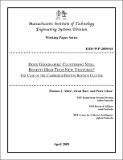| dc.contributor.author | Allen, Thomas J. | |
| dc.contributor.author | Raz, Ornit | |
| dc.contributor.author | Gloor, Peter A. | |
| dc.date.accessioned | 2016-06-02T15:16:34Z | |
| dc.date.available | 2016-06-02T15:16:34Z | |
| dc.date.issued | 2009-04 | |
| dc.identifier.uri | http://hdl.handle.net/1721.1/102835 | |
| dc.description.abstract | An empirical study of scientific communication among biotechnology companies supports the belief that geographic clustering does produce increased scientific exchange among companies. A comparison of companies within a constrained geographic area with those more dispersed shows a significantly higher level of scientific communication among the former. Scientific communication declines rapidly with plupical separation.
Critical of the formation of cluster – based scientific communication networks is the presence of both universities and large firms from the same industry. | en_US |
| dc.language.iso | en_US | en_US |
| dc.publisher | Massachusetts Institute of Technology. Engineering Systems Division | en_US |
| dc.relation.ispartofseries | ESD Working Papers;ESD-WP-2009-01 | |
| dc.title | Does Geographic Clustering Still Benefit High Tech New Ventures? The Case of the Cambridge/Boston Biotech Cluster | en_US |
| dc.type | Working Paper | en_US |
